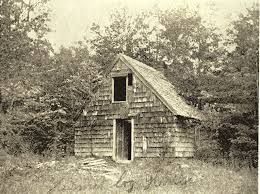 Agnes N. Pickering: The Hermit of Meredith Hill.
Meredith, NH: Meredith Historical Association, 1960?
Agnes N. Pickering: The Hermit of Meredith Hill.
Meredith, NH: Meredith Historical Association, 1960?
The Hermit of Meredith Hill is a modest booklet of nine pages “assembled for the Meredith Historical Society by Agnes N. Pickering.” The hermit was Joseph Plummer (1774-1862), born of parents described as “poor but respectable people,” one of ten children, all of whom were “with the exception of the Hermit, persons of good standing and good property.”
From the outset, the reader can note characteristic solitary behavior. As a child Joseph did not play with siblings or associate with his family, spending his time alone. "If a stranger came suddenly upon him when with his family he would dodge under a bed or into some dark corner.” His schoolroom education was unexceptional. At the age of 21 he purchased several acres at the foot of Meredith Hill and built a log cabin in the middle of the forest as his home. A few years later he built a larger house, with the cabin serving as his shop, and added a barn where he tended an ox. In all this work, his skill with hewn pine wood, doweling, mortar, and shingled roofing was skillful. As the years passed, Joseph acquired many tools, including a foot lathe. He made baskets, chairs, and tubs. He made violins and viols for his own enjoyment. In short, “Joseph was ingenious.”
In 1826, a storm overflowed the nearby brook and swept over his properties. The foundation of his house was damaged, and Joseph feared that his tools would be swept downstream. He ascended the hill to safer land (still on his own property), and built a new hut not unlike his first project. This time, however, he did not add windows or create a formal bed, and added traps to foil imagined intruders. Joseph took to shaking a box with two corn kernels of different colors to make important decisions. He build a weight scale and gathered enormous amounts of firewood that he barely used.
Joseph was a frugal eater, his staples simple: a little meat, “fish, potatoes, corn bread, berries, roots and herbs.” He maintained apple orchards, mashing the apples for juice and cider. He grew some tobacco and tapped maple trees for sugar to sell both. He was always healthy, seldom sick, and needed no eyeglasses even to his death.
Though he was a solitary, Joseph once attempted to court one of the sisters of a nearby family but failed from awkwardness. Especially curious young people visited in winter, with Joseph offering apples and cider. He read and memorized Bible text, but this was not unusual for the era, for he was considered a Calvinist Baptist. Joseph did not attend town meetings or read newspapers, but angered by town plans to build roads around this properties, he was provoked to write angry letters to the local paper.
The wife of a nephew who lived less than a mile from Joseph one day visited the elderly hermit to find him unwell. A couple of days later she returned to find Joseph deceased. Many years prior, Joseph had selected a gravesite near the house, and here he was buried. The tombstone, surrounded by a wall, carried this statement, presumably by family and neighbors attending the deceased: “Content with seeking happiness for himself only, he lived in seclusion. He died alone. Peace to his ashes and rest of his soul.” The author of the pamphlet concludes with more nuance: “He was an industrious and honest man, trod the path to which his nature seemed to have absolutely led him. Who shall say that he did not work out wisely and well the career which the inscrutable had thus fashioned, his being marked out for him upon the earth.”
¶